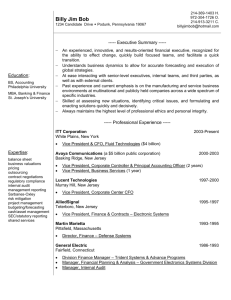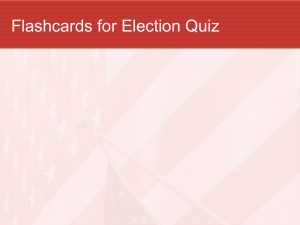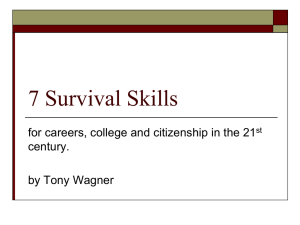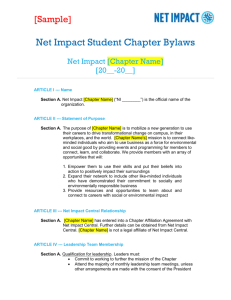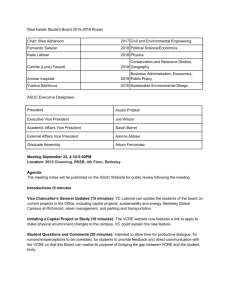The Presidents
advertisement
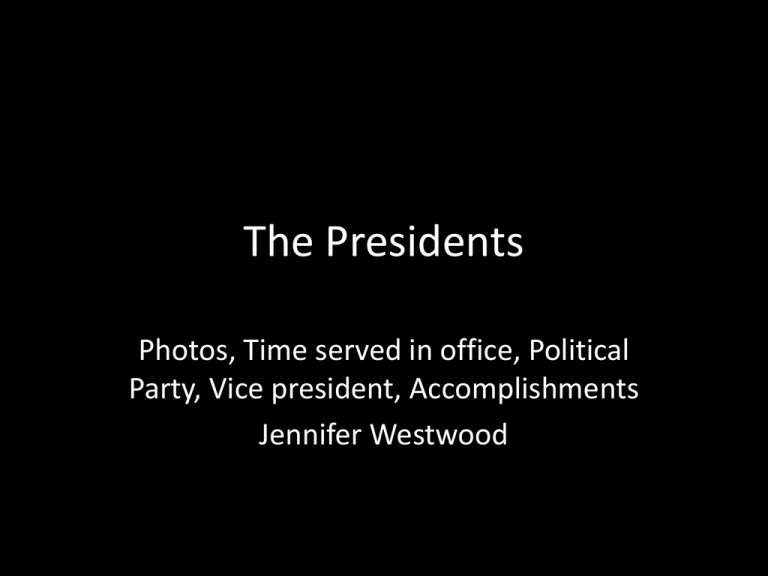
The Presidents Photos, Time served in office, Political Party, Vice president, Accomplishments Jennifer Westwood George Washington (1789-1797) • Vice President: John Adams • Joined states together and helped establish federal government • Kept the United States Neutral in the French Revolution in 1793 • Voluntarily resigned • Not part of a political party, there were no parties in 1789 and they first emerged during his presidency John Adams (1797-1801) • Vice President: Thomas Jefferson • First Vice President • Established many of the basic ideas and principles that made up constitution. • Handled the naval conflict, Quasi-War • He also secured peace with the French and protection for American Merchants while also earning credit for the young nations ability to stand up to European power • Member of the federalist party Thomas Jefferson (1801-1809) • Vice President: Aaron Burr • Member of the DemocraticRepublican Party • Wrote the first draft of the declaration of Independence • Responsible for Louisiana Purchase expanding the US dramatically • Created Embargo Act • Co-founder of the democratic Republican party James Madison (1809-1817) • Vice President: George Clinton (1809-1812), no one (1812-18130, Eldbridge Gerry (18131814), No one (18141817) • Member of DemocraticRepublican party • Helped in writing the Federalist papers • Helped frame the Bill of Rights and enact first revenue legislation James Monroe (1817-1825) • Vice President: Daniel D. Tompkins • Political Party: Democratic- Republican Party • Contended with First Seminole War • Missouri Compromise (1820) and Monroe Doctrine (1823) John Quincy Adams (1825-1829) • Vice President: John C. Calhoun • Member of the Democratic Party • Negotiated the Adams- Onis Treaty • Supported internal improvements including the extension of the Cumberland Road • One of his goals was to protect domestic manufacturing Andrew Jackson (1829-1837) • Vice President: John C. Calhoun (1829-1832), No one (1832-1833), Martin Van Buren (1833-1837) • Member of the Democratic Party • Defined presidency through the nullification crisis and the “Bank War” Martin Van Buren (1837-1841) • Vice President: Richard M. Johnson • Member of the Democratic Party • Advocated lower tariffs and free trade • Set up a system of bonds for the national debt • Reversed Andrew Jackson’s policies and sought peace at home William Henry Harrison (1841) • Vice President: John Tyler • Member of the Whig Political Party. • First president to have been photographed • First to not have been appointed any federal judge • Died a month after taking office of pneumonia John Tyler (1841-1845) • Vice President: none • Member of the Whig Political Party • Tyler’s cabinet resigned after he vetoed banking bills supported by the whigs • Far East opened to US traders after a treaty with China signed • Texas annexed followed by war with Mexico James K. Polk (1845-1849) • Vice President: George M. Dallas • Member of the Democratic Party • Responsible for the reestablishment of the Independent Treasury System • Also, responsible for the reduction of tariffs • Acquisition of some or all of the Oregon Country • Acquisition of California and New Mexico from Mexico Zachary Taylor (1849-1850) • Vice President: Millard Fillmore • Member of the Whig Political Party • He opposed slavery and tried to settle slave states, but he died • Used federal troops to prevent the slave state of Texas from expanding into New Mexican territory • Deciding against colonizing Central America Millard Fillmore (1850-1853) • Vice President: None • Member of the Whig Political Party • Signed the Compromise of 1850 • Fugitive slave act • Nicknamed The American Louise Philippe, Last of the Whigs Franklin Pierce (1853-1857) • Vice President: William King (1853), none (18531857) • Member of the Democratic Party • Signed the KansasNebraska Act of 1854 • Purchased the area now comprising Southern Arizona and part of Southern New Mexico James Buchanan (1857-1861) • Vice President: John C. Brekenridge • Member of the Democratic Political Party • Fought for Kansas to be admitted as a slave state, but lost that battle • Failed in passing the Lecompten Constitution • Buchanan sent army to replace Young as Governor with the non-Mormon in Utah Territory Abraham Lincoln (1861-1865) • Vice President: Hannibal Hamlin (1861-1865), Andrew Johnson (1865) • Member of the Illinois Republican Party • Commander in chief during Civil War • Foreign policies were successful in preventing other countries from intervening in the Civil War • Issued the Emancipation Proclamation • Signed the Homestead Act, the Morrill Act, the National Banking Act, and a bill that chartered the first transcontinental railroad Andrew Johnson (1865-1869) • Vice President: none • Involved in the Democratic; Unionist parties • Signed the Civil Rights Bill • Created new federal civil rights • Responsible for the purchase of Alaska from the Russian Empire in 1867 Ulysses S. Grant (1869-1877) • Vice President, Schuyler Colfax, Henry Wilson, none (75-77) • Member of the Republican Party • Signed bills that promoted Black Voting Rights • Signed the Civil Rights Act of 1875 • Passed the Inflation Bill on April 14, 1874 • Signed the Treaty of Washington for settling the Alabama claims dispute between Britian and the United States by International Arbitration • Include the enforcement of Civil Rights for African Americans in the Reconstruction states Rutherford B. Hayes (1877-1881) • Vice President: William Wheeler • Member of the Republican political party • Signed Domestic Act • Signed Bill Requirement for Black Rights • Passed Bill allowed female attorneys to argue cases before the Supreme Court James A. Garfield (1881) • Vice President: Chester Arthur • Member of the Republican Political party • He attempted to reestablish the Independence of the presidency • Started the work of the Pendleton Civil Service Reform Act Chester Arthur (1881-1885) • Vice President: none • Member of the Republican Party • Signed the Pendleton Civil Service Act which provided for a “classified system” which allowed certain government positions to be obtained only through written examinations • Passed the Tariff Act, lowering tariff prices • Passed the first federal immigration law Grover Cleveland (1885-1889) • Vice President: Thomas Hendricks (1885), none • Member of the Democratic Political Party • Signed an Act creating the Interstate Commerce Commission • Passed a Bill in 1886 that would require the government to coin unlimited amounts of silver, inflating the then-deflating currency. • Angered railroad investors by ordering an investigation of western lands they held by government grant Benjamin Harrison (1889-1893) • Vice President: Levi P. Morton • Member of the Republican Political Party • Passed the Sherman Antitrust Act • Passed the Dependent and Disability Pensions Act • Passed Sherman Silver Purchase Act • Removed tariff from imported raw sugar, and sugar growers in the United States Grover Cleveland (1893-1897) • Vice President: Adlai E. Stevenson • Member of the Democratic Political party • (same as before) William McKinley (1897-1901) • Vice President: Garret Hobart (1897-1899), none(1899-1901), Theodore Roosevelt (1901-1909) • Member of the Republican Political Party • Signed annexing the Republic of Hawaii to the USA • Gold Standard Act where by the US was officially placed on the gold standard Theodore Roosevelt (1901-1909) • Vice President: None (19011905), Charles Fairbanks (1905-1909) • Member of the Republican Political Party • First president to leave the country during his term in order to see the building of the Panama Canal • Won the Nobel Peace Prizenegotiated peace treaty that ended the RussoJapanese War- 1905 William Howard Taft (1909-1913) • Vice President: James Sherman (1909-1912), none (1912-1913) • Member of the Republican Political Party • Passage of the sixteenth amendment • Improved the performance of the postal sercive • Strengthened the Interstate Commerce Commission Woodrow Wilson (1913-1921) • Vice President: Thomas R. Marshall (1912-1921) • Member of the Democratic Political Party • Implemented Federal Reserve Act • Limited RR workers to an 8 hour day • Successfully led US to victory in WWI • Announced the 14 points as guiding principle after war and allies adopted the “Treaty of Versasilles” Warren G. Harding (1921-1923) • Vice President: Calvin Coolidge • Member of the Republican Political Party • Signed a series of bills and amendments passed by congress into law that regulated the farm industry • Supported anti-lynching movement Calvin Coolidge (1923-1929) • Vice President: None, Charles Dawes (1925-1929) • Member of the Republican Political party • Responsible for the rapid economic growth known as the “Roaring Twenties” • Signed the Radio Act of 1927, which assigned regulation of Radio to the newly created Federal Radio Commission • Signed Indian Citizenship Act granting full US citizenship to all American Indians, while permitting them to retain tribal land and cultural rights Herbert Hoover (1929-1933) • Vice President: Charles Curtis • Member of the Republican Political Party • Helped push Tariff and Farm subsidy bills through congress • He expanded Civil Service Coverage of Federal Positions, canceled Private Oil Leases on Government Lands, and By instructing the Justice Department and the Internal Revenue Service to pursue Gangsters for Tax Evasion Franklin D. Roosevelt (1933-1945) • • • • • Vice president: John Nance Garner, Henry A. Wallace, Harry S. Truman Member of the Democratic political party The Securities and Exchange Commission was created to regulate Wall Street. Tennessee Valley Authority (TVA), which built dams and power stations, controlled floods, and modernized agriculture and home conditions in the poverty-stricken Tennessee Valley. The Social Security Act, established Social Security and promised Economic Security for the Elderly, the Poor and the Sick. Harry S. Truman (1945-1953) • • • • • • Vice President: none (1945-1949), Alben Barkley Member of the Democratic Political Party Truman strongly supported the creation of the United Nations Truman was a key figure in the establishment of the Jewish state in the Palestine Mandate. Throughout his presidency, Truman had to deal with accusations that the federal government was harboring Soviet spies at the highest level. Strong supporter of the creation of NATO Dwight D. Eisenhower (1953-1961) • Vice President: Richard Nixon • Member of the Republican Political Party • Successful in having kept America at peace even while confronted with Cold War crises. • He ended the Korean War • Balanced the budget three separate times • Sponsored and signed the Federal Aid Highway Act of 1956 • Sponsored and signed the Civil Rights Bill of 1957 John F. Kennedy (1961-1963) • Vice President: Lyndon B. Johnson • Member of the Democratic Political Party • Became first catholic POTUS • Established the Peace Corps • Responsible for helping divert a nuclear war with the soviet union and secured removal of missiles from Cuba • John F. Kennedy issued an executive order prohibiting discrimination in the sale or lease of housing that was financed by federally guaranteed loans or owned by the federal government. Lyndon B. Johnson (1963-1969) • • • • • • Vice President: none, Hubert Humphrey (1965-1969) Member of the Democratic Political Party In conjunction with the civil rights movement, Johnson overcame southern resistance and convinced Congress to pass the Civil Rights Act of 1964 Johnson signed the Immigration Act of 1965, which substantially changed U.S. immigration policy toward non-Europeans Johnson increasingly focused on the American military effort in Vietnam. During Johnson's administration, the first human spaceflight to the Moon, Apollo 8, was successfully flown by NASA in December 1968 Richard Nixon (1969-1974) • Vice Presidents: Spiro Agnew, none, Gerald Ford • Member of the Republican Political party • President Nixon traveled to China to try and encourage peace and more contact between the two nations • Nixon approved the development of NASA's Space Shuttle program • He established the Consumer Product Safety Commission in 1972 • Paris Peace Accords were signed in 1973 Gerald Ford (1974-1977) • Vice Presidents: none, Gerald Ford (1973-1974) • Member of the Republican Political party • Ford issued Proclamation 4311, which gave Nixon a full and unconditional pardon for any crimes he may have committed against the United States while President • Introduced a conditional amnesty program for Vietnam War draft dodgers who had fled to countries such as Canada. Jimmy Carter (1977-1981) • Vice President: Walter Mondale • Member of the Democratic Political Party • He encouraged energy conservation, installed solar panels on the White House, and wore sweaters while turning down the heat. • Bailed out Chrysler • He led the plan to deregulate the airline industry. • He canceled military pay raises during a time of high inflation and government deficits. Ronald Reagan (1981-1989) • Vice President: George Bush • Member of the Republican Political Party • His mix of tax cuts, deregulation etc. helped fuel and economic boom that lasted two decades • Had a tax reform and passed tax reform act of 1986 that simplified the income- tax code by eliminating many shelters and reducing other deductions • Known for voicing his values and often recounted the wisdom of the founding fathers. He also championed the cause of the prolife and family- values movements. George H.W. Bush (1989-1993) • • • • • • Vice President: Dan Quayle Member of the Republican Political Party Bush's Administration, along with the Progressive Conservative Canadian Prime Minister Brian Mulroney, spearheaded the negotiations of the North American Free Trade Agreement (NAFTA) Bush reauthorized the Clean Air Act, requiring cleaner burning Fuels. Bush signed a Bill providing additional benefits for Unemployed Workers. Americans with Disabilities Act of 1990 Bill Clinton (1993-2001) • Vice President: Al Gore (19932001) • Member of the Democratic political party • Longest economic expansion in American history • More than 22 million new jobs • Lowest unemployment in 30 years • Raised education standards, increased school choice, and double education and training investment • Lowest crime rate in 26 years • Added 100,000 more police to the streets George W. Bush (2001-2009) • Vice President: Dick Cheney • Banned partial birth abortion • reversed Clinton's policy of not requiring parental consent for abortions under the Medical Privacy Act • Signed two income tax cuts, one of which was the largest dollar-value tax cut in world history Barack Obama (2009-2017) • Vice President: Joe Biden • According to obamaachievments.org he had “done a lot for veterans” • Ended war in Iraq • In office when Osama Bin Laden was killed


